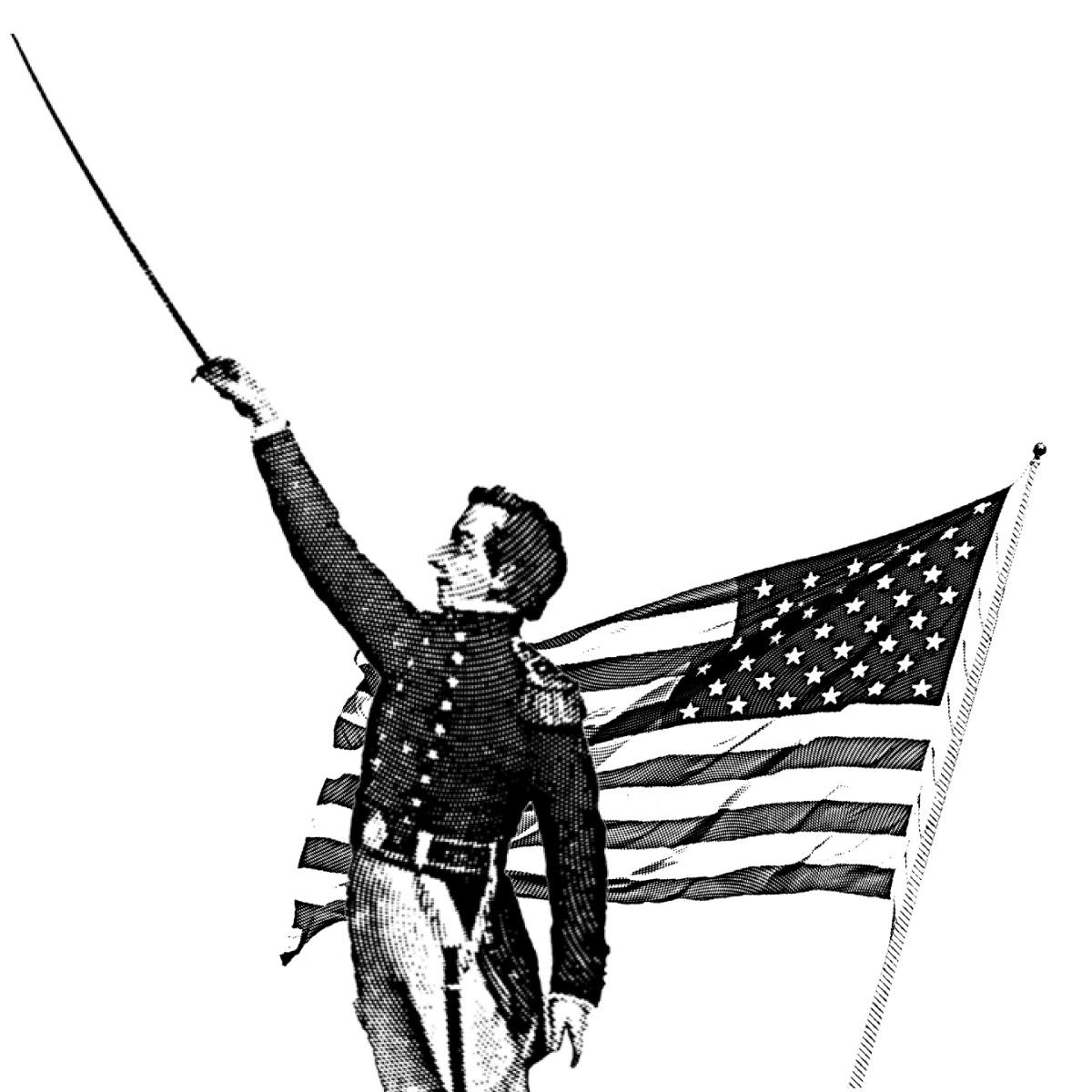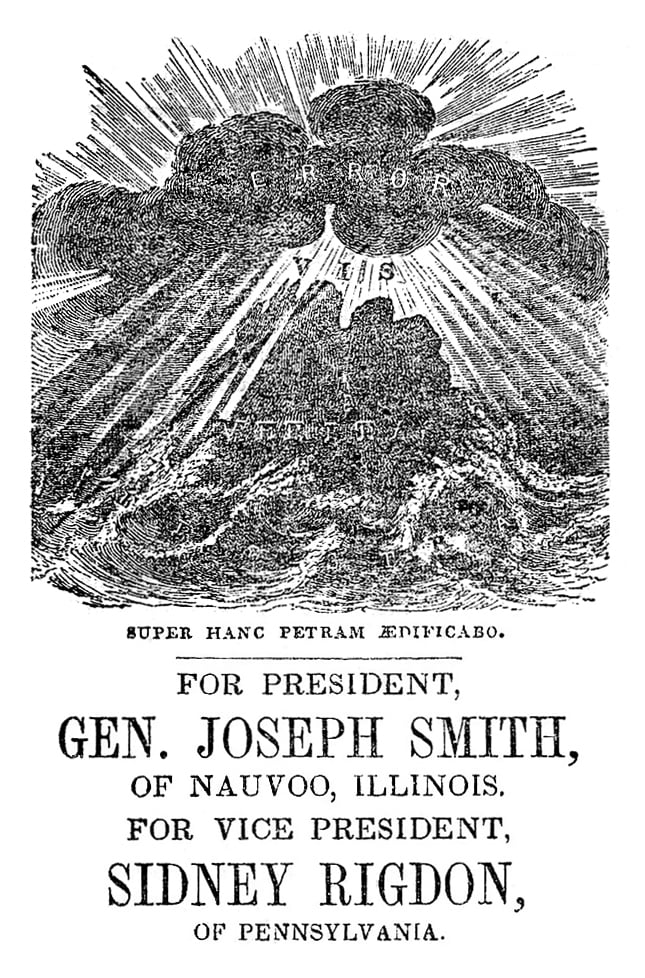Joseph Smith's Presidential Campaign


Did Joseph Smith run for president?
Yes. Joseph Smith[BIO] was a candidate in the 1844 United States presidential election.[1] Sidney Rigdon[BIO] ran as his vice president.[2]
Why did Joseph Smith run for president?
Joseph Smith said he wanted to protect the rights of Latter-day Saints and "the weak and oppressed.”[3][4][5] As President, he said he would “protect the people in their rights & liberties.”[6]
Why didn’t he just support a good candidate already in the race?
Joseph initially supported Henry Clay for President.[7] In late 1843, Joseph wrote to five presumptive presidential candidates asking what their actions would be regarding the Latter-day Saints and how they would assist in their Missouri troubles.[8]
Three candidates responded, including Clay, but no one committed to help.[9]
When did Joseph decide to run for president?
On January 29, 1844, Joseph met with local leaders “to take into consideration the proper course for this people to pursue in relation to the coming Presidential Election.”[10] In this meeting, Willard Richards[BIO] said that Joseph should run for President. The men unanimously agreed.[11]
Timeline of Joseph Smith’s Presidential Run
November 29, 1839
Fall 1840
August 29, 1843
November 4, 1843
November 15, 1843
Henry Clay responds to Joseph Smith, saying he will not commit to helping the Saints.[16]
December 2, 1843
John C. Calhoun responds to Joseph Smith and says the federal government does not have the authority to intervene with the Saints’ troubles in Missouri.[17]
December 9, 1843
Lewis Cass responds to Joseph Smith, saying the President does not have the power to intervene in the Saints’ conflicts in Missouri.[18]
January 2, 1844
Joseph Smith writes back to John C. Calhoun, condemning his response.[19]
January 29, 1844
February 8, 1844
Joseph Smith’s campaign pamphlet containing his views is read publicly for the first time, and Joseph states that he entered the election to protect religious and civil rights.[21]
February 14, 1844
Nauvoo Neighbor first reports on Joseph Smith’s candidacy for president.[22]
February 20–21, 1844
Under Joseph’s direction, the Twelve Apostles select men to find a place for the Saints to move to "have a government of our own" after the temple is completed.[23]
March 4, 1844
March 8, 1844
March 10, 1844
Joseph Smith forms a council, which becomes the "Council of Fifty," to discuss letters from Saints in Wisconsin asking to relocate to Texas.[27]
March 11, 1844
March 14, 1844
Council of Fifty sends Lucien Woodworth to Texas.[30]
March 21, 1844
Council of Fifty approves Wilford Woodruff’s letter to Solomon Copeland inviting him to run as Joseph’s vice president.[31]
April 9, 1844
244 Elders in Nauvoo volunteer to electioneer for Joseph Smith throughout the country.[32]
April 11, 1844
The Council of Fifty accepts Joseph Smith as "Prophet, Priest, and King."[33]
May 3, 1844
May 6, 1844
Sidney Rigdon is chosen as Joseph Smith’s running mate during a meeting of the Council of Fifty.[36]
May 13, 1844
Joseph Smith writes back to Henry Clay, strongly condemning him and his response.[37]
May 17, 1844
A convention in Nauvoo nominates Joseph Smith for President and Sidney Rigdon for Vice President. Delegates are selected to attend a national convention in Baltimore.[38]
June 27, 1844
Joseph Smith is killed at Carthage Jail.[39]
July 13, 1844
The National “Mormon Convention” meets in Baltimore and endorses no candidate for president.[40]
What party did he run for?
Joseph Smith said that he would not run as a Whig or Democrat, but as an independent candidate.[41]
Related Question
What is the official Church policy related to politics?
Read more in Contemporary Church Political Policy
What was Joseph’s campaign platform?
Joseph Smith’s presidential platform included the abolition of slavery, the annexation of Texas, drastic prison reform, a national bank, a reduction of Congress’s pay and size, and expanded presidential powers.[42]
Joseph’s campaign slogan was “Jeffersonianism, Jeffersonian Democracy,[43] free trade and Sailors rights, protection of person & property.”[44][45]
Issue | Joseph Smith’s View: |
Slavery | “Petition also, ye goodly inhabitants of the slave states, your legislators to abolish slavery by the year 1850, or now, and save the abolitionist from reproach and ruin, infamy and shame. Pray Congress to pay every man a reasonable price for his slaves out of the surplus revenue arising from the sale of public lands, and from the deduction of pay from the members of Congress. Break off the shackles from the poor black man, and hire him to labor like other human beings.”[46][47] |
Territorial Expansion | “if Texas petitions Congress to be adopted among the sons of liberty, give her the the right hand of fellowship; and refuse not the same friendly grip to Canada and Mexico: and when the right arm of freemen is stretched out in the character of a navy, for the protection of rights, commerce and honor, let the iron eyes of power, watch from Maine to Mexico, and from California to Columbia . . . and when a neighboring realm petitioned to join the union of the sons of liberty, my voice would be, come: yea come Texas: come Mexico; come Canada; and come all the world—let us be brethren: let us be one great family; and let there be universal peace.”[48] |
Prison System | “Petition your state legislatures to pardon every convict in their several penitentiaries: . . . Advise your legislators when they make laws for larceny, burglary or any felony, to make the penalty applicable to work upon roads, public works, or any place where the culprit can be taught more wisdom and more virtue; and become more enlightened. . . . Murder only can claim confinement or death. Let the penitentiaries be turned into seminaries of learning, where intelligence, like the angels of heaven, would banish such fragments of barbarism: Imprisonment for debt is a meaner practice than the savage tolerates with all his ferocity.”[49] |
Banking | “let Congress shew their wisdom by granting a national bank, with branches in each state and territory, where the capital stock shall be held by the nation for the mother bank: and by the states and territories, for the branches: and whose officers and directors shall be elected yearly by the people with wages at the rate of two dollars per day for services: which several banks shall never issue any more bills than the amount of capital stock in her vaults and the interest. The nett gain of the mother bank shall be applied to the national revenue, and that of the branches to the states and territories’ revenues. And the bills shall be par throughout the nation, which will mercifully cure that fatal disorder know in cities, as brokerage; and leave the people’s money in their own pockets.”[50] |
Congress | “Reduce Congress at least one half. Two Senators from a state and two members to a million of population, will do more business than the army that now occupy the halls of the National Legislature. Pay them two dollars and their board per diem; (except Sundays,) that is more than the farmer gets, and he lives honestly.”[51] |
Presidential Powers | “Give every man his constitutional freedom, and the president full power to send an army to suppress mobs; and the states authority to repeal and impugn that relic of folly, which makes it necessary for the governor of a state to make the demand of the president for troops, in cases of invasion or rebellion The governor himself may be a mobber . . .”[52] |
Did Joseph Smith want to turn the United States into a theocracy?
Probably not. While Joseph’s campaign pamphlet does mention God several times,[53][54] his primary message was “unadulterated freedom.”[55] He had previously referred to himself as the “greatest advocate” of the Constitution.[56]
Joseph ran for president to protect people’s rights.[57][58]
But didn’t Joseph Smith want to establish a theocracy?
Yes, but not in the United States. With the Council of Fifty, Joseph wanted to establish a theocracy in the West,[59] independent of existing governments.[60]
Joseph viewed “theocracy” as seeking God’s will and implementing it as law.[61] He also wanted the new government to protect religious freedom.[62][63]
Why did Joseph run for president if he wanted to establish a separate theocracy?
It’s unclear. While the Council of Fifty helped organize Joseph’s presidential campaign,[64] they also discussed plans for a theocracy outside of the United States.[65][66]
The Nauvoo City Council had written a petition to Congress requesting that Nauvoo be granted the status of a federal territory and receive protection from U.S. troops.[67][68] The Council of Fifty sent a petition for Joseph to be authorized to raise 100,000 armed volunteers to protect Americans in U.S. territories.[69][70]
Joseph hoped that the petitions would protect them until they and their government were strong enough to protect themselves.[71] It is possible the presidency was just another way to accomplish this.[72]
What was the Council of Fifty?
The Council of Fifty was a group of about fifty men, led by Joseph Smith, that sought to establish a theocratic government.[73][74][75] They believed they were establishing God’s kingdom on earth, according to biblical prophecies.[76][77][78]
The official name of the Council was “The Kingdom of God and his Laws, with the keys and power thereof, and judgement in the hands of his servants. Ahman Christ.”[79]
While the Council did make some ecclesiastical decisions,[80] Joseph said that the Kingdom of God was separate from the Church of God.[81] The Council also helped organize the presidential campaign.[82]
Was Joseph Smith made "king" by the Council of Fifty?
Yes. On April 11, 1844, Erastus Snow[BIO] motioned that the Council of Fifty receive Joseph as their “Prophet, Priest & King, and uphold him in that capacity in which God has anointed him.” The motion was accepted unanimously.[83]
Members of the Council saw Joseph as the mouthpiece of God and "the man chosen of God to bring to pass the establishment of the kingdom of God."[84] A draft of the Council's constitution states that the Lord had appointed Joseph to reveal God's will concerning the Kingdom on earth, and that the Lord was the King of Kings.[85][86]
Joseph said the Council should “use the term ‘proper source’ instead of ‘king’ and it will be all understood and no person can take advantage.”[87]
Did he think he could win the election?
Probably. Based on Joseph’s own statements[88][89] and those of his supporters,[90][91] they seem to have believed that it was a possibility.[92]
Hundreds of people electioneered for Joseph across the nation.[93] Conventions were held to endorse Joseph and choose electors to send to the electoral college if he were to win a state’s popular vote.[94][95][96]
What happened with the campaign?
Joseph Smith was killed several months before the 1844 election.[101] He became the first presidential candidate to be assassinated in American history.[102]
Democratic candidate James K. Polk won the election.[103]
Related Question
How did Joseph and Hyrum Smith die?
Read more in Joseph & Hyrum Smith's Martyrdom



 about this topic
about this topic